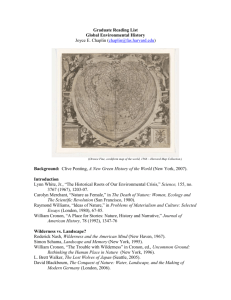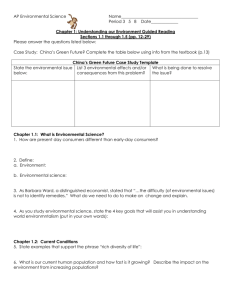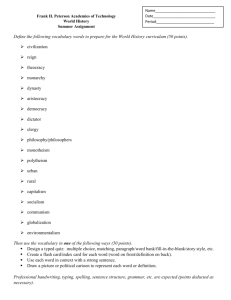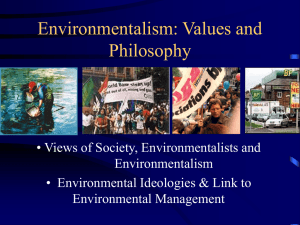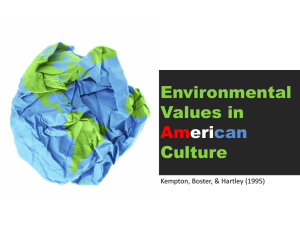Winter Quarter 2006 Environmentalism Past, Present and Future Professor Hecht
advertisement
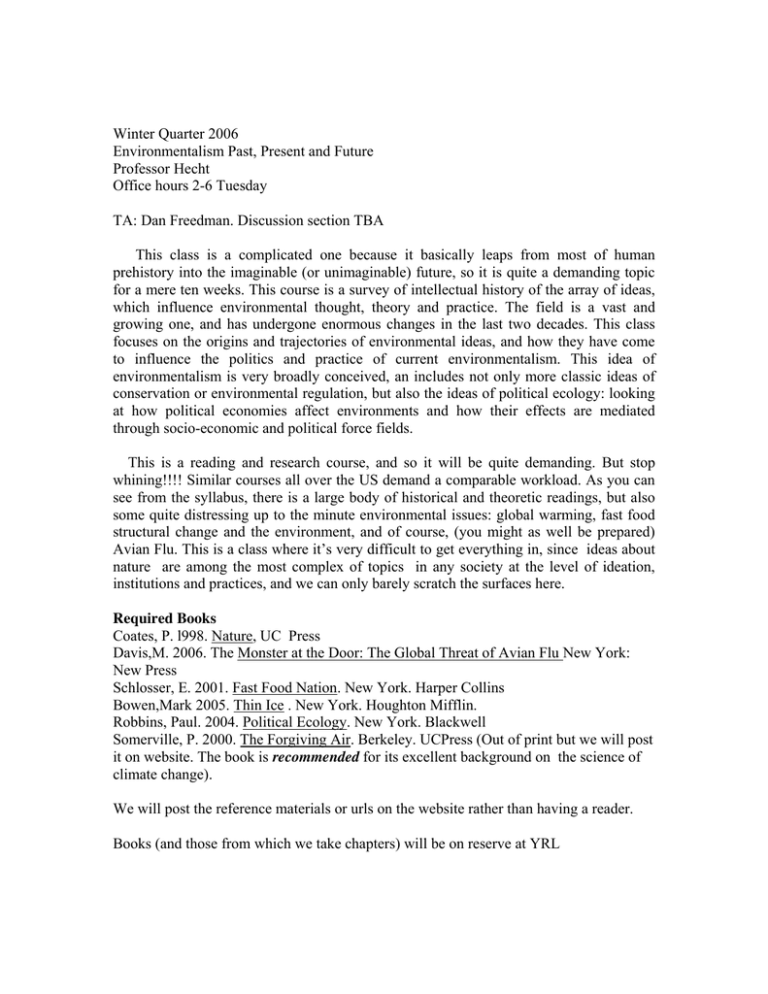
Winter Quarter 2006 Environmentalism Past, Present and Future Professor Hecht Office hours 2-6 Tuesday TA: Dan Freedman. Discussion section TBA This class is a complicated one because it basically leaps from most of human prehistory into the imaginable (or unimaginable) future, so it is quite a demanding topic for a mere ten weeks. This course is a survey of intellectual history of the array of ideas, which influence environmental thought, theory and practice. The field is a vast and growing one, and has undergone enormous changes in the last two decades. This class focuses on the origins and trajectories of environmental ideas, and how they have come to influence the politics and practice of current environmentalism. This idea of environmentalism is very broadly conceived, an includes not only more classic ideas of conservation or environmental regulation, but also the ideas of political ecology: looking at how political economies affect environments and how their effects are mediated through socio-economic and political force fields. This is a reading and research course, and so it will be quite demanding. But stop whining!!!! Similar courses all over the US demand a comparable workload. As you can see from the syllabus, there is a large body of historical and theoretic readings, but also some quite distressing up to the minute environmental issues: global warming, fast food structural change and the environment, and of course, (you might as well be prepared) Avian Flu. This is a class where it’s very difficult to get everything in, since ideas about nature are among the most complex of topics in any society at the level of ideation, institutions and practices, and we can only barely scratch the surfaces here. Required Books Coates, P. l998. Nature, UC Press Davis,M. 2006. The Monster at the Door: The Global Threat of Avian Flu New York: New Press Schlosser, E. 2001. Fast Food Nation. New York. Harper Collins Bowen,Mark 2005. Thin Ice . New York. Houghton Mifflin. Robbins, Paul. 2004. Political Ecology. New York. Blackwell Somerville, P. 2000. The Forgiving Air. Berkeley. UCPress (Out of print but we will post it on website. The book is recommended for its excellent background on the science of climate change). We will post the reference materials or urls on the website rather than having a reader. Books (and those from which we take chapters) will be on reserve at YRL Course requirements 1. Class participation. 10% of grade 2. Maintain an “Environmental Diary” from either the NY or LA times on enviro issues during the quarter. This involves basically a one paragraph summary of the main enviro stories of the day/week for the quarter..While it doesn’t need to be a daily summary (some stories go on for weeks like the China chemical spill that contaminated a major river and caused a great deal of political insurgence); and some like global change are relentlessly on going, it should involve at least two stories a week. NYTimes Science Tuesday is an excellent resource. % Grade 15% 3.Mid term: required by all. 40% of grade 4. Final: Undergrads. Research paper: grad students. 35% of grade We will post things on line at the website, or at least the URLS, but also for most you should be able to access them the ISI web of knowledge. Part I. General introduction and historical background Week One: Introduction and General Review of the Course. The meaning of everything. Week Two No class week two because of MLK day. We will make this class up as well as President’s day by holding class in exam week. With the usual numbers, its too complicated to make up the class on a separate day or time. Week Three: From Past to Future: Some Big Current Issues and Ideas: What is it supposed to mean? The current context: E Lepers et al 2005. A Synthesis of information on rapid land cover change from 19812000. Bioscience 55 (2) 115-124 Vitousek et al. l997. Human Domination of the Earth’s Ecosystems. Science. 277:494499 Historical roots: Grove, R. 1990.The Origins of Environmentalism. Nature 345 p11 White, L. 1967. Historical Roots of our Ecologic Crisis. Science 155, 1203-07 Coates. Chapter 1-5 Week Three: Big Issues in the past: rethinking the roots: Enlightenment, the Scientific Revolution and Coates Chaps 6,7 Merchant, C. l980 Chapters 1,3,5 In: The Death of Nature: Women Ecology and the Scientific Revolution. New York. Harpers Pepper, D .l984 "Roots of Technological Environmentalism" In Roots of Modern Environmentalism. Croom Held. Week Four: The Beginning of Modern Debates Coates: 6-7 Robbins, Chapter 2. Worster, D. 1993. “John Muir and the roots of american environmentalism” The Wealth of Nature Oxford Press pp 203-220 Spense, M. 1999. Chaps 1 and 2: “Looking backward and westward”; “The wild west” Dispossessing the Wilderness. Oxford. MacKenzie,J.1987. Chivalry, Social Darwinism and ritualized killing: the Hunting Ethos in Central Africa. In: D. Anderson, and R. Grove Conservation In Africa , Cambridge Press pp41-61 Marchant, C. 1996. Reinventing Eden. Western Culture as a Recovery Narrative. In W Cronon. (ed) Uncommon Ground WW Norton 132-172 Cartmill,M 2000. "The bambi syndrome" In: View to a Death in the Morning. Harvard. (And a chance to view the important environmental film “Bambi”) Nelson, M. 1998.”An Amalgamation of Wilderness Preservation Arguments” In: Caldecott and Ne,lson (1998) The Great New Wilderness Debate. Athens. University of Georgia pp154-200 . Week Five: Into the modern: The extension of the “environmental question” into everyday life. ( Take home Mid term handed out.) Koppes, C, 1988. Efficiency Equity and Ethics. In Worster ,D. Ed (1988) The Ends of the Earth Cambridge. Cronon, W. 1996. the Trouble with Wilderness: or, Getting back to the wrong nature. In W Cronon (ed) Uncommon Ground WW Norton 69-90 Proctor, J. 1996. Whose Nature? W Cronon (ed) Uncommon Ground WW Norton 26996 Fairhead J, and M. Leach. 1995. False Forest History. World Development Vol 23, No.6. 1023-1035 Coates: Chap 7. Robbins: Chapter 5 Week Six: The question of global environment “I never thought the future woul come so soon” Taylor, P and F. Buttel. l992. How do we know we have environmental problems? Science and the globalization of the environmental discourse. Geoforum Vol 23 (3) 405-416. Sommerville: The Forgiving Air Robbins: Chap 3,5 Begin Bowen (Chaps TBA) Week Seven Finish Bowen Demerrit,D.2001. The Construction of Global warming and the politics of science. Annals of the AAG 91(2) 173-93 Week Eight: Welcome to the new global environment Davis: The Monster at the Door Week Nine: Questions of Food Supply Schlosser Fast Food Nation Week Ten Globalization, commodification, social justice and environment: Fragmentation and forest transitions. Why what goes on there is part of what happens here. . Hecht et al 2006. Globalization, Forest Resurgence, Social Processes and Environmental Politics in El Salvador. World Development (in Press) Hecht, SB 2005. Soybean Production, Development and Conservation on an Amazon Frontier, Development and Change, V. 36 (2) March 2005. (Take Home Final)
